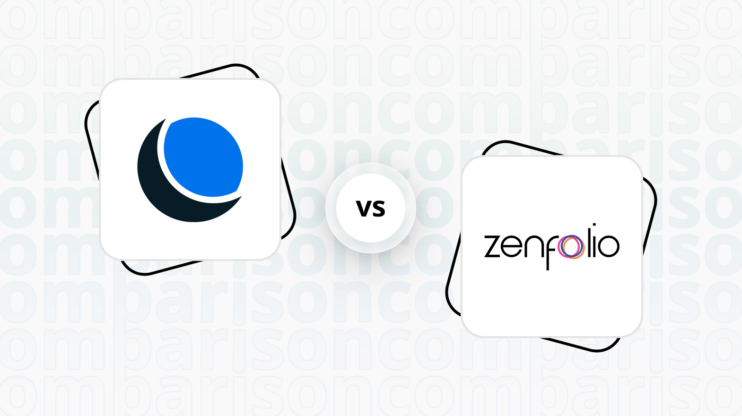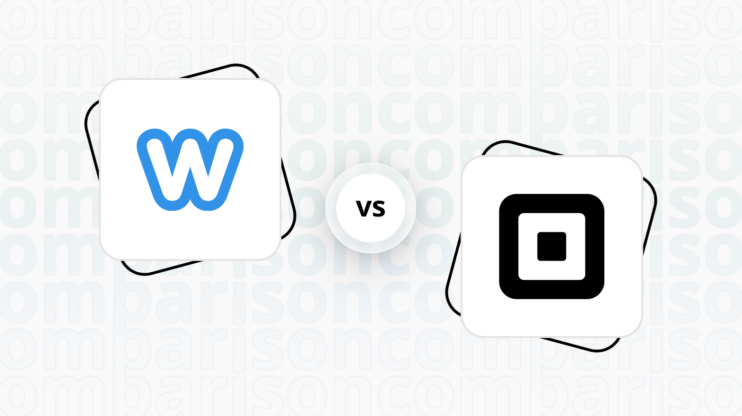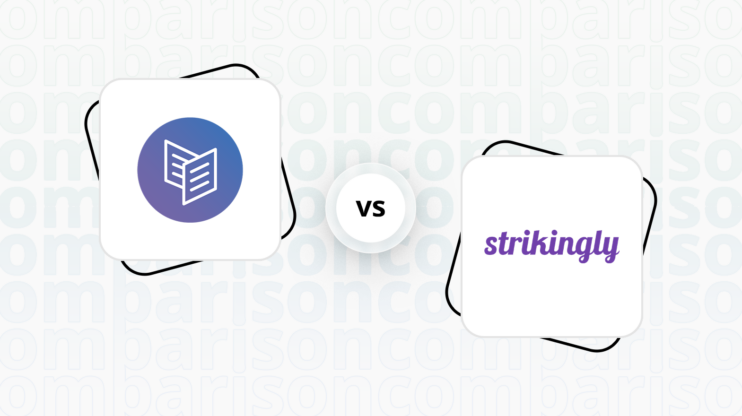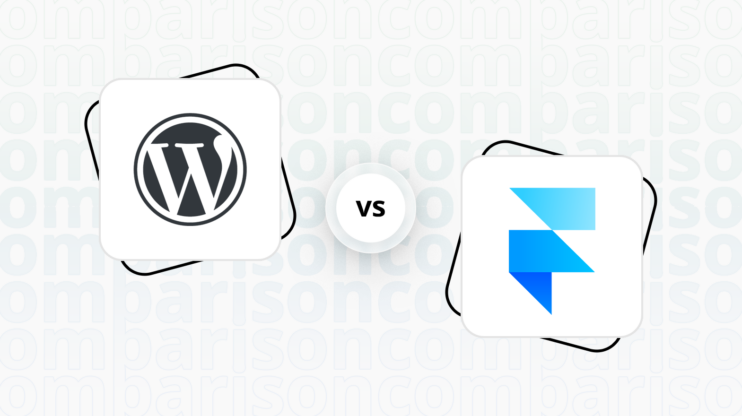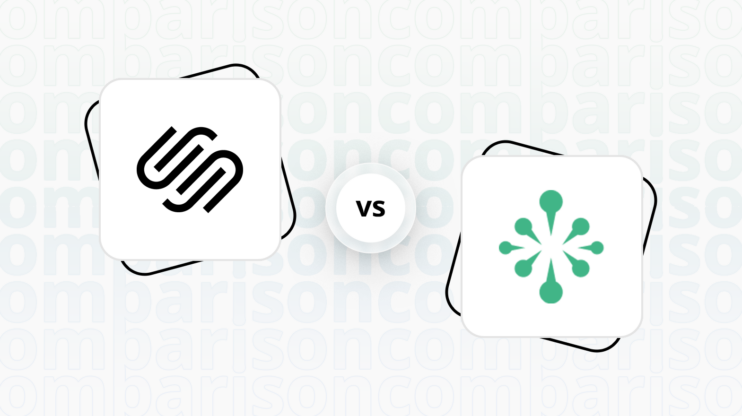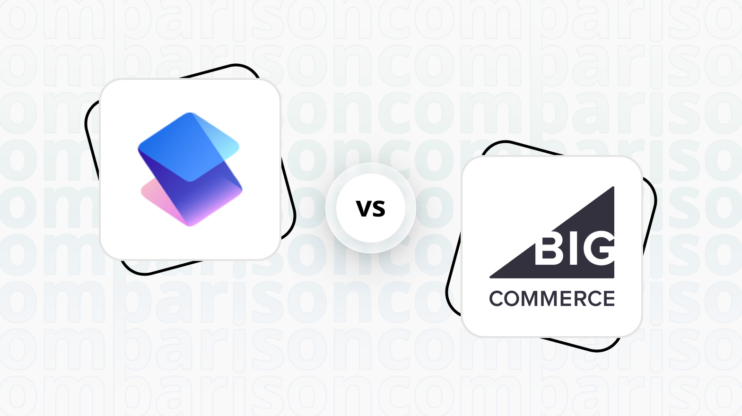Final verdict
Shopify and Instapage cater to different needs, making them suitable for distinct user bases.
-
Shopify (Overall Grade: 8.1/10)
is a robust ecommerce platform designed for businesses looking to create and manage online stores. It excels in providing comprehensive ecommerce features, advanced marketing tools, and strong security measures. Shopify’s extensive app store and integrations make it a powerful choice for scaling businesses. When comparing Shopify vs Instapage, Shopify is ideal for users seeking a dedicated ecommerce solution with a focus on sales and business growth. -
Instapage (Overall Grade: 6.6/10)
is a specialized landing page platform aimed at improving advertising conversion through personalization and optimization. It offers an intuitive drag-and-drop interface, AI content generation, and detailed analytics, making it perfect for marketers focused on lead generation and conversion optimization. Considering Shopify vs Instapage, Instapage is best suited for users who need high-performing landing pages to support their marketing campaigns.

|

|
|
|---|---|---|
|
Design functionalities & templates |
8.2 |
8.0 |
|
Ease of use |
7.5 |
8.5 |
|
Ecommerce |
9.2 |
4.2 |
|
Website Editors |
7.9 |
7.5 |
|
Product testing options |
8.1 |
6.1 |
|
Price |
8.2 |
7.0 |
|
Hosting quality |
9.0 |
6.0 |
|
Website speed optimization |
7.8 |
6.2 |
|
Plugins and integrations |
8.7 |
6.8 |
|
Marketing features |
8.8 |
7.7 |
|
Customer support |
8.6 |
7.6 |
|
Security |
9.0 |
8.4 |
|
AI capabilities |
7.9 |
6.0 |
|
User Management |
6.5 |
7.3 |
Best for ecommerce
 9.2
9.2
 4.2
4.2
Verdict
: Instapage is suitable for creating high-converting landing pages with some ecommerce integrations, while Shopify excels as a comprehensive ecommerce platform.
-
Shopify
: Known for its extensive ecommerce features, Shopify is ideal for businesses looking to scale. It offers a comprehensive store builder, advanced inventory management, multi-channel selling, and detailed analytics. When comparing Shopify vs Instapage, Shopify stands out with a score of 9.2 for its robust ecommerce capabilities. -
Instapage
: Primarily a landing page platform, Instapage offers limited ecommerce features, mainly through integrations with platforms like Shopify and payment gateways such as Stripe and Paypal. It is best suited for businesses focusing on conversion optimization rather than full-scale ecommerce, reflected in its score of 4.2.
Best for informational & business websites
 6.8
6.8
 7.9
7.9
Verdict
: When it comes to creating informational and business websites, Instapage has a slight edge over Shopify. While Shopify is a robust platform primarily designed for ecommerce, Instapage excels in creating high-conversion landing pages and informational sites with ease.
-
Shopify
: Shopify, with a score of 6.8, is primarily an ecommerce platform but can be adapted for informational websites. It offers sleek, professional templates and a range of tools for managing online stores. However, its focus on ecommerce means it may be more complex than necessary for simple informational sites. For those who need a powerful platform with ecommerce capabilities, Shopify is a solid choice. -
Instapage
: Instapage, scoring 7.9, is designed to create high-performing landing pages and informational sites. Its intuitive drag-and-drop interface and extensive collection of templates make it easy to build and optimize pages without needing a developer. Instapage’s focus on personalization, optimization, and testing makes it ideal for businesses looking to improve advertising conversion and customer satisfaction. When comparing Shopify vs Instapage, Instapage stands out for its ease of use and specialized features for informational websites.
Detailed comparison
Design functionalities & templates
Design FunctionalitiesRepresents how well each platform allows for creative design and customization of websites.Score Components:
- Template Variety (30%): Range and quality of design templates.
- Customization (30%): Flexibility and options for design alterations.
- User Interface (20%): Ease and intuitiveness of the design process.
- Responsiveness (10%): Adaptability to different devices and screen sizes.
- Innovation (10%): Unique design features and tools.
 8.2
8.2
 8.0
8.0
🏆
Winner: Shopify.
If you’re looking for a platform that offers a professional look with a focus on online stores, Shopify is the preferred choice.
Shopify’s templates are sleek and professional, ideal for ecommerce sites. They offer a sophisticated look with a focus on online stores. While the free template selection is not large, Shopify’s premium theme store provides a variety of industry-specific options, offering advanced features for a strong brand presence.
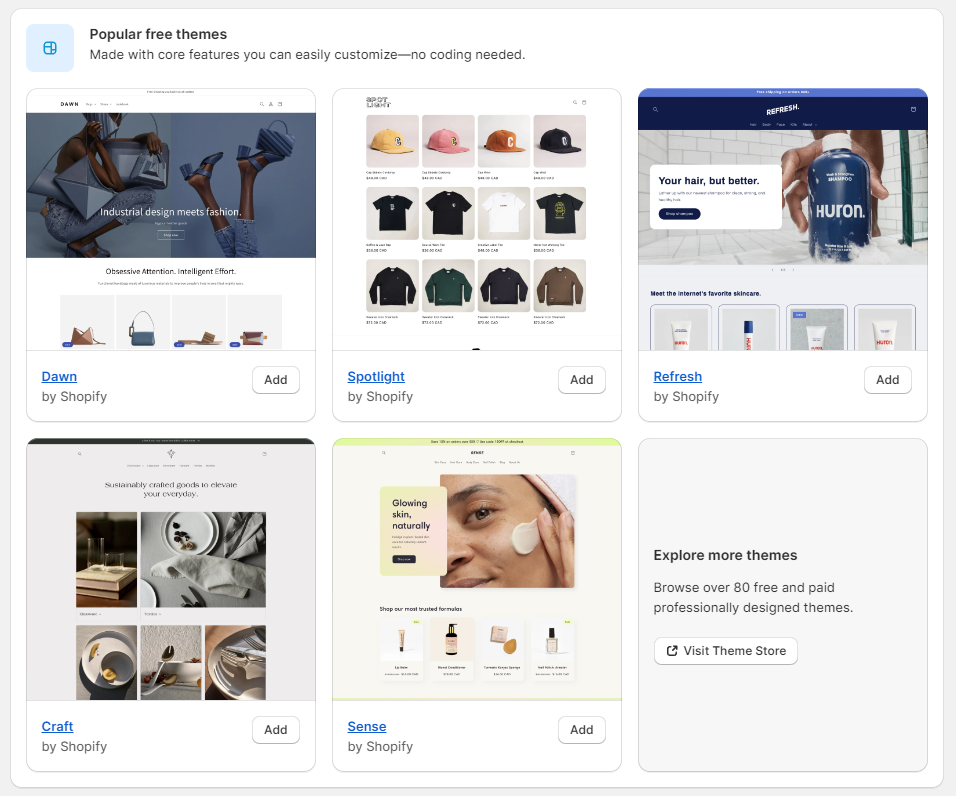
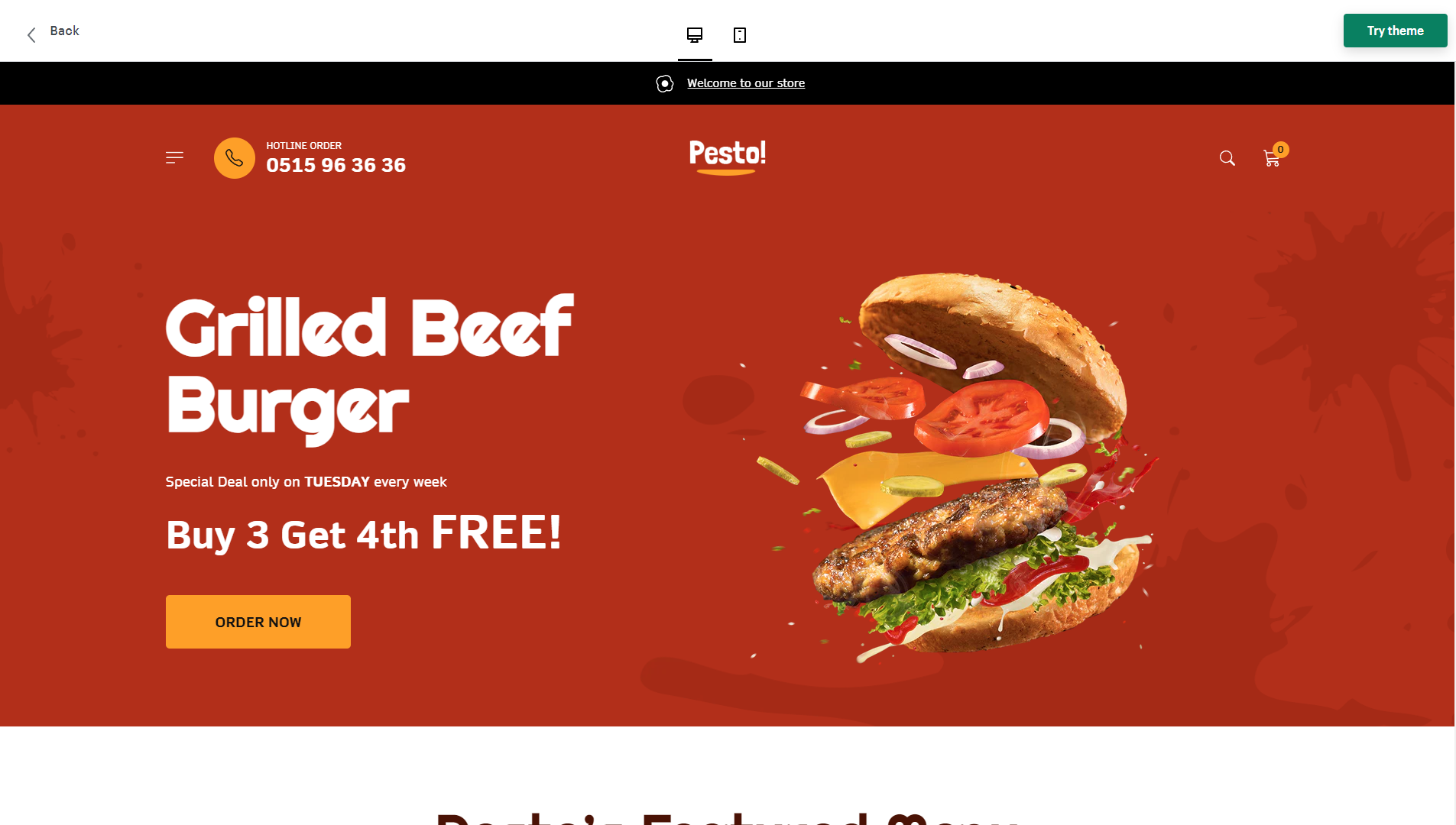
Compared to Shopify, Instapage provides an extensive collection of 100+ design templates for website building, business-specific templates. These templates are tailored to support small teams and businesses in executing their marketing campaigns efficiently, including features for marketing automation, CRM, and analytics integrations.
Get a head start on website creation with AI
Create a custom website tailored to your business needs 10X faster with 10Web AI Website Builder!
Ease of use
Ease of useReflects the platform’s overall user-friendliness.Score
Components:
- Learning curve (40%): Quickness and ease of getting started.
- Interface design (30%): Simplicity and intuitiveness of layout.
- User guidance (20%): Quality of tutorials and support.
- Flexibility (10%): Adaptability to various user skills.
 7.5
7.5
 8.5
8.5
🏆 Winner: Instapage
. Scoring 8.5, Instapage offers an intuitive drag-and-drop interface that simplifies the creation of landing pages, making it accessible to users with various levels of technical expertise. Shopify, with a score of 7.5, offers a robust platform but with a steeper learning curve, especially for those new to ecommerce. If ease of use is a priority, Instapage is the clear winner in this category.
Learning Resources
🏆 Winner: Shopify
. While both platforms offer solid learning resources, Shopify goes a step further with its wide array of detailed tutorials and active community forums, making it easier for users to learn and adapt.
For ecommerce
EcommerceMeasures the platform’s effectiveness in supporting online business activities.Score Components:
- Ecommerce themes and templates (20%): Variety and design of templates.
- Product management (25%): Ease of managing and organizing products.
- Payment options (25%): Variety and convenience of payment methods.
- Ecommerce features (20%): Features for managing an ecommerce store.
- Integration (10%): Compatibility with external e-commerce tools and services.
 9.2
9.2
 4.2
4.2
Shopify is a leading ecommerce platform with a comprehensive set of features for online businesses. It offers tools for creating and customizing online stores, managing products, processing payments, and handling order fulfillment. On the other hand, Instapage is primarily a landing page platform with limited ecommerce capabilities. It supports integration with ecommerce platforms such as Shopify and payment gateways such as Stripe and Paypal.

|

|
|
|---|---|---|
|
Ecommerce themes and templates |
8.2 |
0.0 |
|
Product page customization |
8.5 |
0.0 |
|
Payment processing and commissions |
8.8 |
5.0 |
|
POS capabilities |
8.1 |
0.0 |
|
Payment gateways |
9.5 |
6.0 |
|
Product numbers |
9.0 |
0.0 |
|
Additional ecommerce features |
9.1 |
4.0 |
Shopify ecommerce features:
- Comprehensive store builder
- Shopify Payments and other gateways
- Advanced inventory management
- Multi-channel selling
- Abandoned cart recovery
- Detailed analytics and reporting
Instapage ecommerce features:
- Shopify integration
- Payment gateways such as Stripe and Paypal
Ecommerce themes & templates
Shopify offers about 150 modern responsive themes for creating a virtual storefront, ensuring a good look on both desktop and mobile devices. While some themes are free, others cost between $170 to $380. In contrast, Instapage does not have ecommerce specific templates.
Product page customization
Shopify allows for three options per product, totaling 100 unique variations. While Shopify offers titles, descriptions, and image galleries with zoom effects, customization options like adding ribbons, size charts, and wishlists are not as straightforward. However, Shopify distinguishes itself with additional features through its extensive library of extra apps, offering functionalities like reviews, Facebook stores, eBay item importers, and a unique Augmented Reality feature for an enhanced customer experience. Instapage, on the other hand, does not have product page customization capabilities.
Payment processing
Shopify offers payments with typical charges of 2.9% + 30¢ per online transaction on basic plans, and lower fees for higher-tier plans. However, it adds extra fees for using other payment gateways. Shopify Payments is Shopify’s own payment processing gateway. It allows merchants to accept credit card payments directly on their store without having to integrate third-party payment providers. This simplifies the payment process, reduces transaction fees, and streamlines the handling of finances.
Instapage supports payment gateway integration, notably through external systems and third-party services like Commence Payments for Stripe, facilitating various payment options such as Apple Pay, Google Pay, and card payments. The platform itself does not directly charge commissions for transactions, but payment gateways may have their own fees. While Instapage specializes in creating high-converting landing pages with a focus on online marketing, it does not explicitly offer Point of Sale (POS) capabilities, suggesting a primary use case away from direct sales or retail transactions.
Website Editors
Website EditorsEvaluates the platforms’ website building and editing capabilities.Score Components:
- Customization tools (40%): Range and power of editing features.
- Editor usability (30%): User experience within the editor.
- Design flexibility (20%): Freedom in layout and design changes.
- Update and maintenance ease (10%): Simplicity of updating and maintaining the site.
 7.9
7.9
 7.5
7.5
🏆
Winner: Shopify
. Shopify’s editor, with a score of 7.9, excels in providing a streamlined, ecommerce-focused editing experience. It’s particularly beneficial for users who prioritize efficient management of online stores. The editor is straightforward, making it easy to add products, manage inventory, and set up payment methods. Shopify’s editor is optimized for sales and business growth, with built-in tools specifically designed for ecommerce businesses.
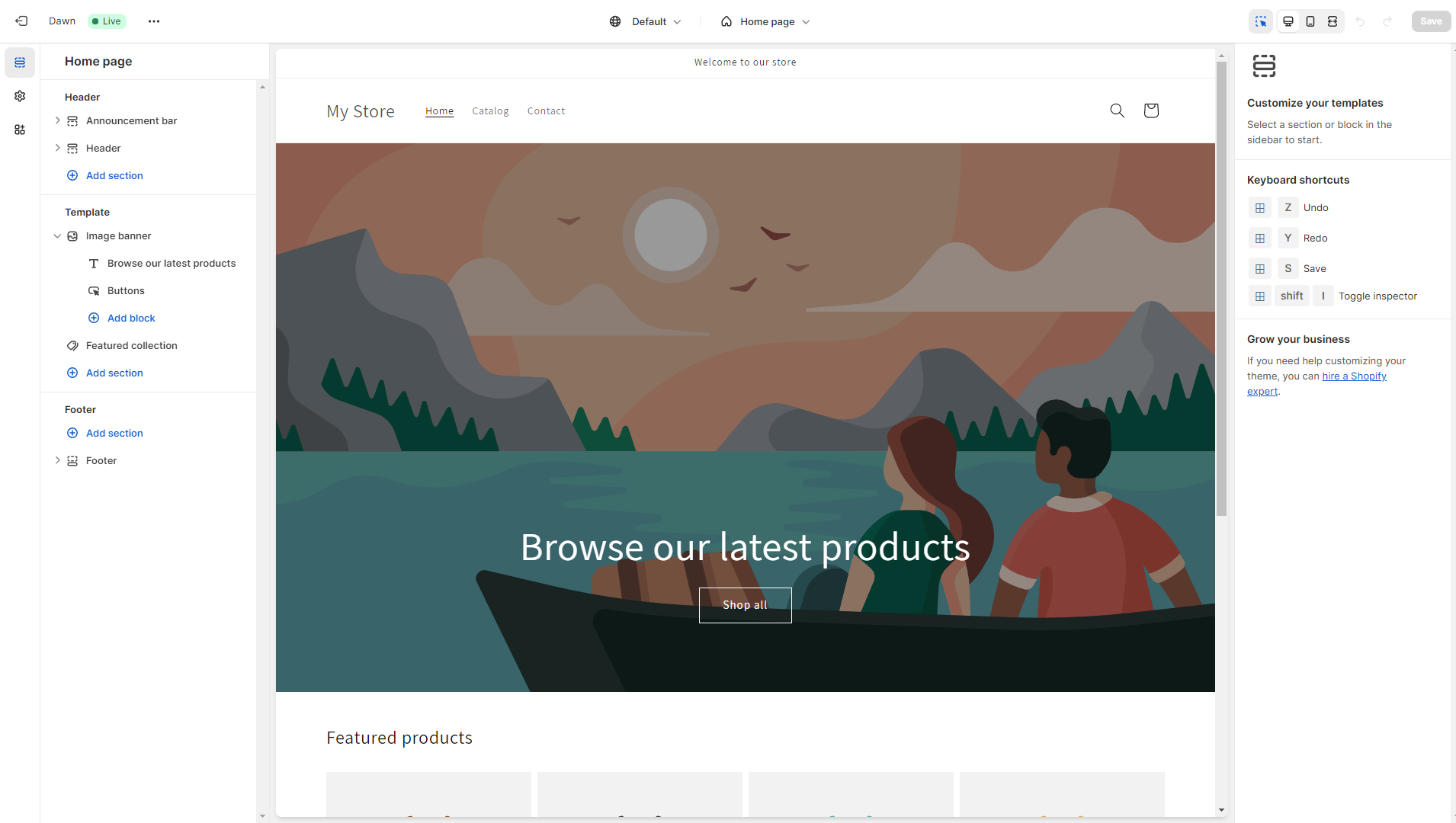
Instapage’s editor, scoring 7.5, is a comprehensive website builder focused on creating and optimizing landing pages for various marketing campaigns. It offers a drag-and-drop editor, AI content generation, detailed analytics, and extensive customization through custom code editing, alongside security and compliance features. The platform supports collaboration, integrates with numerous marketing tools, and is designed to streamline the process of building, testing, and optimizing landing pages to increase conversions.
Mobile editor/app
 8.0
8.0
 0
0
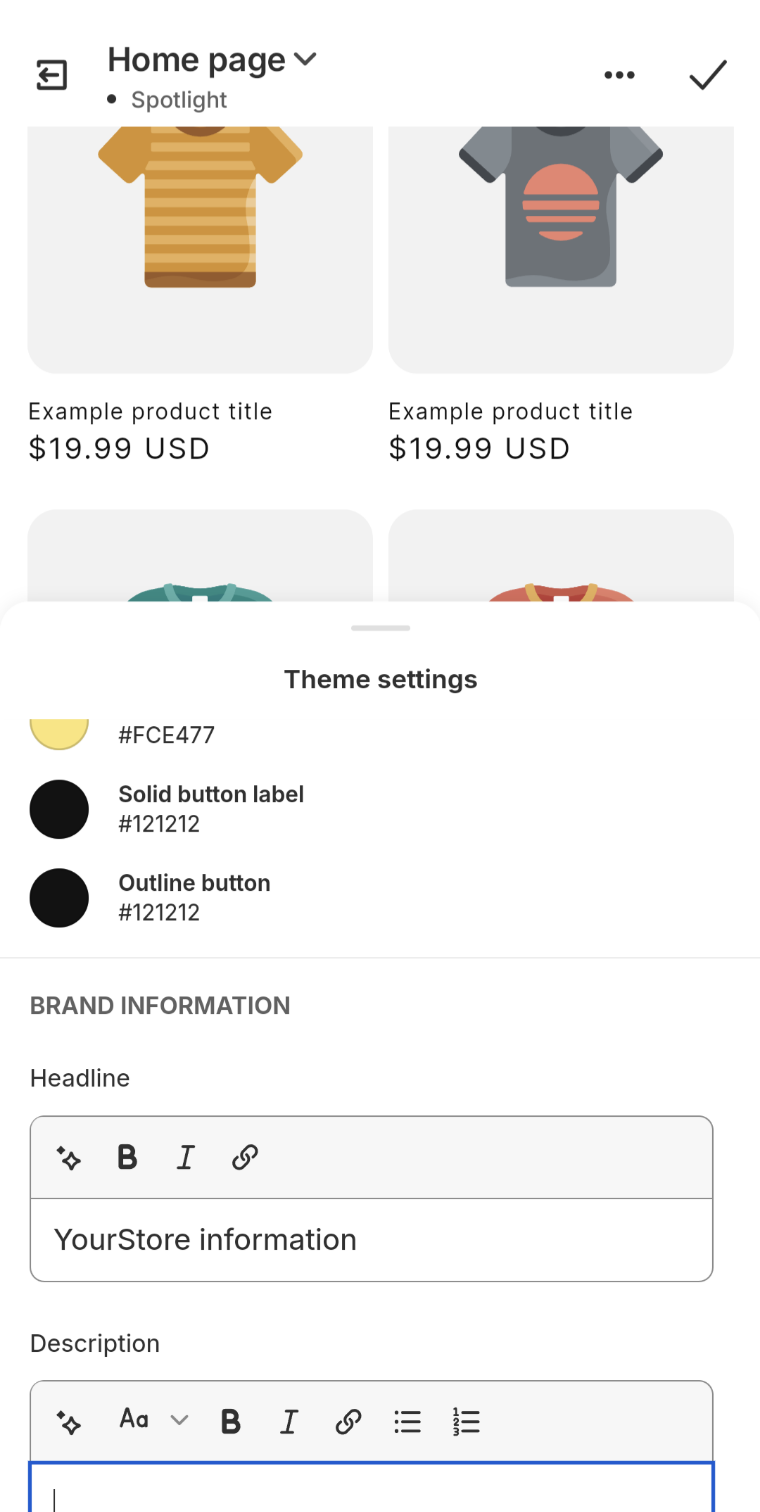
🏆
Winner: Shopify
. Shopify offers a mobile app that includes a user-friendly mobile theme editor. This allows users to customize their online store website directly from their mobile device. This feature enables the addition, removal, editing, and rearrangement of content on the store’s website, offering convenient on-the-go adjustments to the store’s appearance and layout.
On the other hand, Instapage does not have a dedicated mobile editor app. This means that users cannot make changes to their landing pages on the go, which could be a significant disadvantage for some users.
In summary, Shopify is the clear winner in this category due to its mobile editing capabilities.
Product testing options
Product Testing OptionsAssesses the options for trying out platform features before commitment.Score Components:
- Trial quality (40%): Extent and usefulness of the trial or free version.
- Feature accessibility (30%): How many features are available to test.
- Trial duration (20%): Length of the trial period.
- Ease of transition (10%): Smoothness of moving from trial to paid plans.
 8.1
8.1
 6.1
6.1
Overall Result
:
Shopify Wins
. Shopify scores 8.1, offering a 14-day free trial with access to all features, including premium ones. Instapage, scoring 6.1, also provides a 14-day free trial, but requires users to fill in their payment information, which may lead to automatic charges if not cancelled by the end of the trial period.

|

|
|
|---|---|---|
|
Free Plan |
No | No |
|
Trial Duration |
14 days | 14 days (payment information required) |
|
Testing Premium Features |
All features during free trial |
During the free trial |
|
Money Back Guarantee |
14-day free trial | 24 hours |
Price
PriceLooks at the cost-effectiveness and value for money of each platform.Score Components:
- Plan value (40%): What each pricing tier offers.
- Transparency and clarity (30%): Clearness of pricing structures.
- Flexibility of plans (20%): Range of options to suit different budgets.
- Hidden costs (10%): Additional expenses not included in the plan.
 8.2
8.2
 7.0
7.0
Shopify offers a range of plans for different needs, while Instapage has a more expensive starting price but offers a comprehensive landing page platform.

|

|
|
|---|---|---|
|
$20-$30 |
Shopify Basic ($29/month): Unlimited products, 2.9% + 30¢ card fee with Shopify payments, Extra 2% gateway fee without Shopify Payments, Abandoned cart recovery, Automated sales tax, Digital products, POS Integration, 2 staff accounts. Value for price: 8.0 |
No offering at this amount. |
|
$70-$80 |
Shopify Standard ($79/month): Lower card fees (2.6% + 30¢), Gift cards, Professional reports, 5 staff accounts. Value for price: 8.5 |
No offering at this amount. |
|
$200+ |
Advanced Shopify ($299/month): Lowest card fees (2.49% + 30¢), Advanced report builder, Real-time carrier shipping, Up to 15 staff accounts Value for price: 8.8 |
BUILD ($299/month): Optimize conversions with experimentation and lead generation. Includes #1 Landing page builder, No Conversion Limits, Server-Side A/B Testing, AI Content, Unlimited Triggered Popups, Thor Render Engine, Dynamic Text Replacement, SSL Encryption, GDPR Compliance, Google SSO, Zapier, HubSpot, Salesforce, Marketo Integration, Multi-Step Forms, Invisible reCAPTCHA, and more. Value for Price: 7.5 |
location. As a result in rare cases the prices displayed here can differ from the ones you see on their
websites.
Hosting quality
Hosting
qualityExamines the reliability and performance of the hosting solutions.Score Components:
- Uptime (40%): Consistency and reliability of website availability.
- Speed (30%): Loading times and performance.
- Bandwidth and storage (20%): Sufficiency of resources provided.
- Data centers (10%): Quality and distribution of hosting infrastructure.
 9.0
9.0
 6.0
6.0
🏆
Winner: Shopify
Shopify’s proprietary cloud-based hosting, with a 99.99% uptime guarantee and multiple global data centers, is ideal for high-traffic online stores. Instapage, with a 99.9% uptime guarantee and undisclosed data center locations, provides a more general-purpose hosting solution. Shopify’s superior reliability and transparency earn it a higher rating.

|

|
|
|---|---|---|
|
Do they offer hosting? |
Yes, included in all paid plans |
Yes |
|
Data Centers: |
5 globally: USA (Ashburn, Virginia; Santa Clara, California), Canada (Toronto, Ontario), Ireland (Dublin), and Singapore |
Not disclosed |
|
Type of hosting: |
Proprietary cloud-based hosting |
Cloud Hosting |
|
Uptime: |
99.99% |
99.9% |
|
Uptime Guarantee: |
Yes, 99.99% |
Yes, 99.9% |
Website Speed Optimization
Website Speed OptimizationEvaluates optimization of website loading timesScore Components:
- PageSpeed Score (30%): Google’s score indicating performance optimization.
- Loading Time (30%): The average time until a website is fully interactive.
- Mobile Optimization (15%): Optimization effectiveness for mobile devices.
- Resource Optimization (15%): Optimizing images, scripts, and other heavy resources.
- CDN Usage (10%): Use of CDN to enhance speed across geolocations.
 7.8
7.8
 6.2
6.2
🏆 Winner: Shopify
Both Shopify and Instapage prioritize website performance and page speed, but Shopify has a higher score in this area, indicating better performance.

|

|
|
|---|---|---|
|
Focus |
App optimization, Google AMP |
Responsive design, Image optimization, Caching |
|
Performance Tools |
Google Lighthouse, PageSpeed Insights |
Not specified |
|
Key Strategies |
App efficiency, Theme optimization |
Responsive design, Image optimization, Caching |
|
Load Times |
Varies widely, dependent on optimization |
Varies depending on optimization |
|
Page Speed Scores Range |
Scores vary; influenced by apps, images |
Not specified |
|
Core Web Vitals Improvement |
Emphasis on LCP, FID, CLS improvements |
Not specified |
Shopify’s approach to enhancing site speed includes app optimization by removing unneeded app code, conditionally loading apps, avoiding immediate pop-up displays, and incorporating app functionality directly into themes. This approach leverages Shopify’s fast servers and CDN network to boost load speed. Shopify also suggests utilizing Google AMP for faster mobile page loads, although with some design compromises. Analysis of three Shopify sites showed a range of Shopify speed scores from 14 to 75, Google PSI scores from 8 to 80, and load times varying from 10.6 seconds to 2.3 seconds. Continuous maintenance and optimization are essential for keeping Shopify stores fast.
Instapage, on the other hand, emphasizes responsive design, image optimization, and caching as their key strategies for speed optimization. However, they do not provide any specific information on their performance tools, load times, PageSpeed scores range, or Core Web Vitals improvements. This lack of transparency makes it difficult to assess their performance in this area.
Get a head start on website creation with AI
Create a custom website tailored to your business needs 10X faster with 10Web AI Website Builder!
Plugins and integrations
Plugins and integrationsMeasures the range and effectiveness of additional plugins and integrations.Score Components:
- Variety of options (40%): Range of available add-ons.
- Integration smoothness (30%): Ease of integrating plugins into the site.
- Quality of plugins (20%): Functionality and reliability of the options.
- Custom integration capabilities (10%): Support for custom or third-party integrations.
 8.7
8.7
 6.8
6.8
🏆 Winner: Shopify.
With a score of 8.7, Shopify outperforms Instapage, which scores 6.8. Shopify offers over 8,000 apps in its App Store, covering a wide range of functionalities, while Instapage supports over 40 integrations with third-party platforms. Shopify’s plugins and integrations enhance ecommerce by offering advanced sales, marketing, and payment options, among others. On the other hand, Instapage’s integrations extend its base functionalities, enabling advanced analytics, sophisticated A/B testing, and direct email marketing automation. However, Shopify’s extensive range of plugins and integrations gives it the upper hand in this comparison.
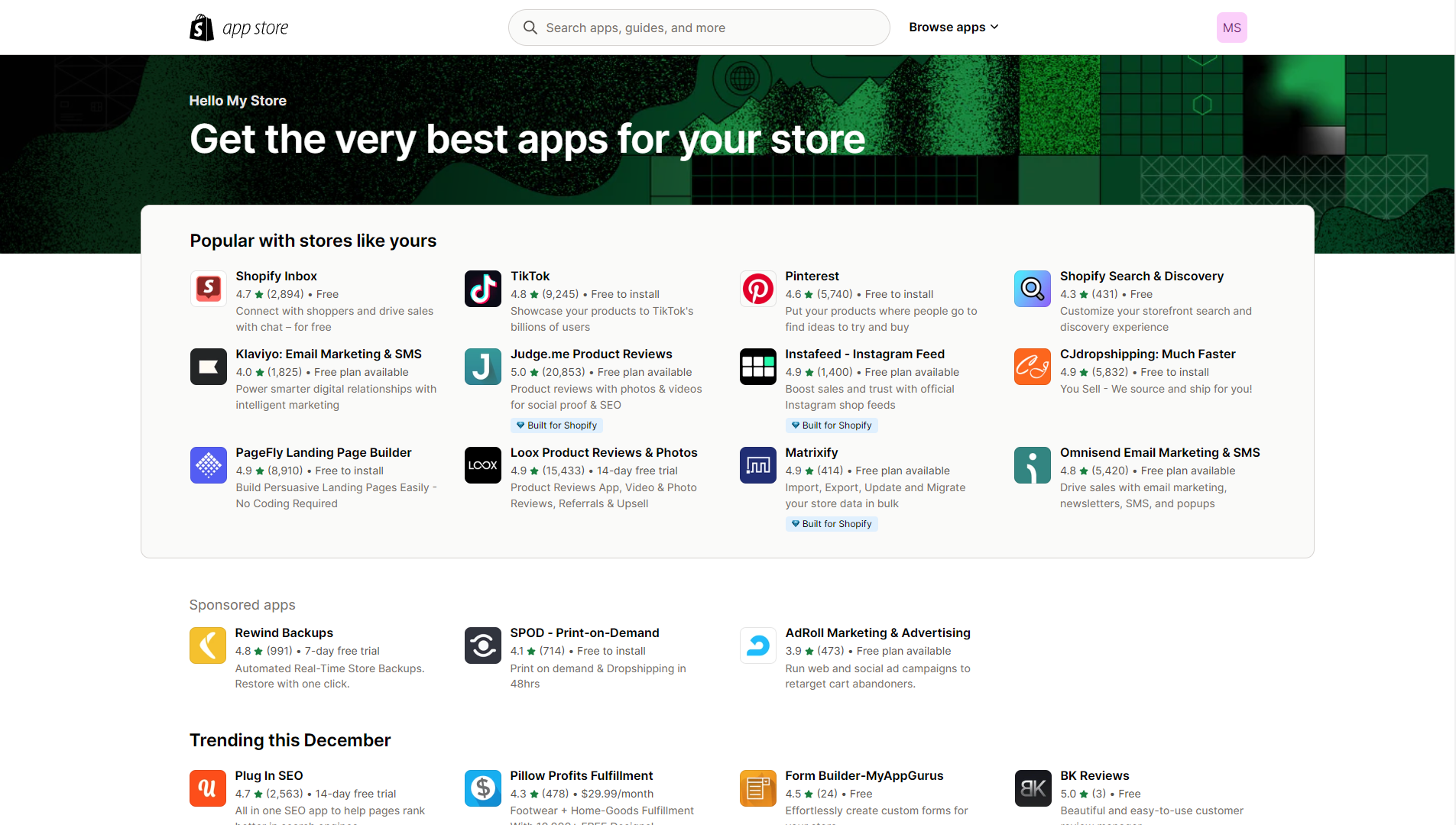
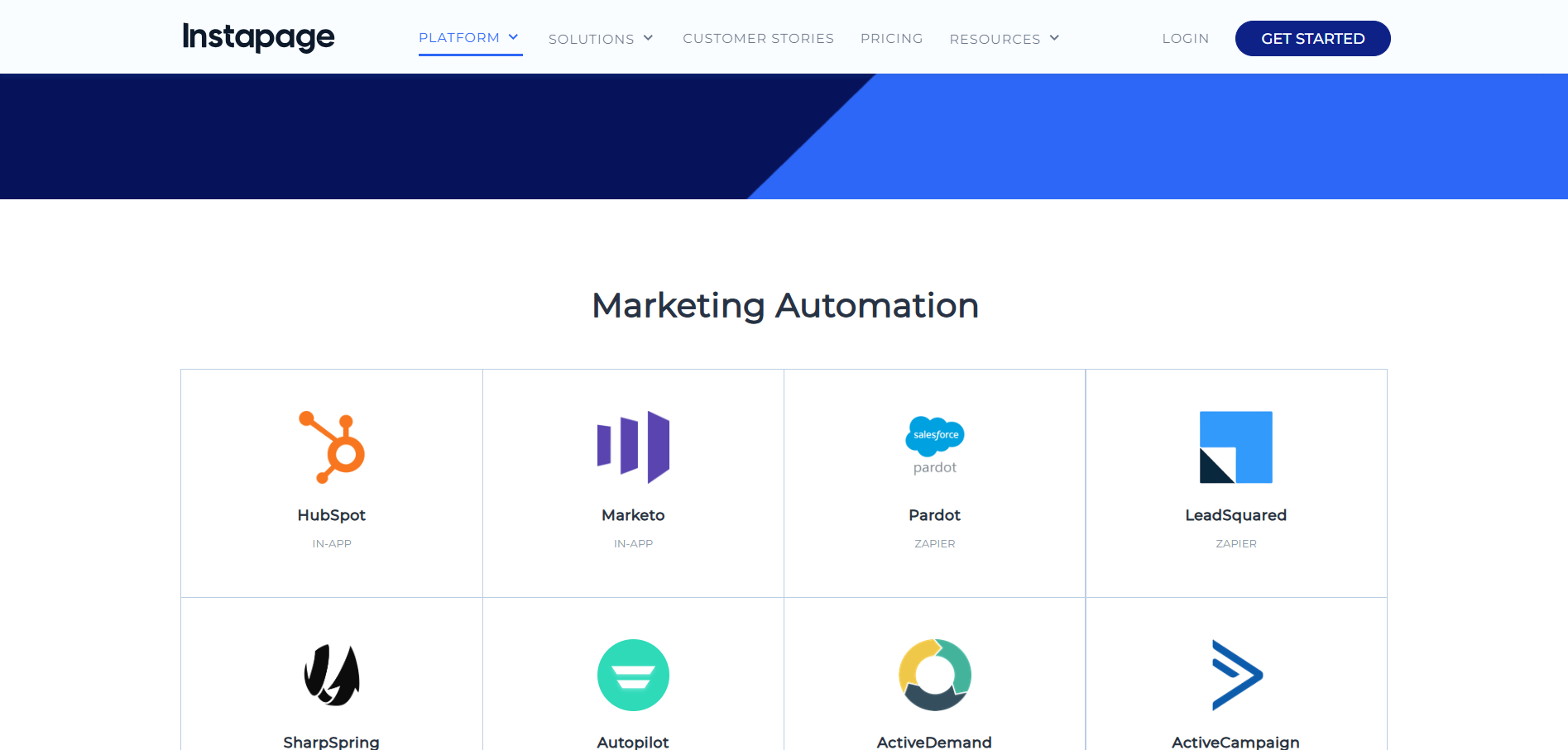
Marketing Features
Design FunctionalitiesRepresents how well each platform allows for creative design and customization of websites.Score Components:
- Template Variety (30%): Range and quality of design templates.
- Customization (30%): Flexibility and options for design alterations.
- User Interface (20%): Ease and intuitiveness of the design process.
- Responsiveness (10%): Adaptability to different devices and screen sizes.
- Innovation (10%): Unique design features and tools.
 8.8
8.8
 7.7
7.7
🏆
Overall Winner: Shopify
. Shopify stands out for its more advanced ecommerce-focused marketing tools, especially in analytics and ad campaign management. Instapage is strong in conversion optimization and personalization, ideal for landing page strategies.

|

|
|
|---|---|---|
|
SEO Tools |
|
|
|
Email Marketing |
|
|
|
Blogging |
|
|
|
Social Media Integration |
Advanced integration for selling directly on social platforms |
Basic integration for campaign management |
|
Analytics and Reporting |
Detailed analytics for in-depth insights |
Conversion analytics, real-time reports, and A/B testing |
|
Ads and Promotions |
Google Ads integration; sophisticated ad campaign management |
AdMap for ad-to-page personalization and integration with advertising platforms |
Customer Support
Customer supportEvaluates the quality and availability of support options.Score Components:
- Response time (40%): Speed of support responses.
- Support quality (30%): Effectiveness and helpfulness of the support.
- Availability (20%): Range of support channels (phone, chat, email).
- Resource richness (10%): Quality of self-help and educational materials.
 8.6
8.6
 7.6
7.6
🏆 Winner: Shopify
. Comparing Shopify vs Instapage, Shopify takes the lead with a higher customer support score of 8.6. Shopify offers 24/7 support through chat, email, and phone, ensuring that users can get help at any time. The platform also provides extensive tutorials, a vibrant community forum, and a valuable marketing blog, making it easier for users to find solutions and grow their businesses.
Instapage, with a customer support score of 7.6, offers live chat support from Monday to Friday, 24 hours a day, and additional support via email and phone during business hours. While Instapage’s support is robust, it does not match the round-the-clock availability of Shopify. However, Instapage excels in providing personalized assistance for its Convert plan users through Success Managers and Launch Specialists, ensuring tailored support for optimizing conversion rates and maximizing ROI.
Security
SecurityLooks at the platforms’ security measures and data protection.Score Components:
- Data protection (40%): Safeguards for user and customer data.
- SSL and encryption (30%): Implementation of secure connections.
- Compliance (20%): Adherence to industry security standards.
- Regular updates (10%): Frequency of security updates and patches.
 9.0
9.0
 8.4
8.4
🏆
Winner: Shopify
. Shopify’s security measures are comprehensive, including secure infrastructure, encryption, limited access, two-factor authentication, regular audits, and a dedicated incident response team. They also provide free SSL certificates and a built-in Web Application Firewall for added security.
Instapage also places a significant focus on security, with compliance to GDPR and SOC 2 Type I and Type II, risk management policies, and an Information Security Program based on ISO 27001/2 and NIST 800-53 frameworks. However, Shopify’s higher security score and more detailed security features give it the edge in this comparison.
AI Capabilities
AI capabilitiesMeasures the effectiveness of AI-driven features and tools.Score Components:
- Automation efficiency (40%): Impact of AI on streamlining processes.
- Personalization (30%): AI-driven customization for users or customers.
- AI-Assisted design (20%): Role of AI in website design and functionality.
- Data analysis (10%): Use of AI in interpreting user data and analytics.
 7.9
7.9
 6.0
6.0

|

|
|
|---|---|---|
|
AI Builder |
Shopify AI Builder offers functionalities like theme section builder, content generation, SEO optimization, and email marketing tools. |
|
|
AI Ecommerce Features |
Shopify pioneers AI-driven eCommerce with personalized recommendations, dynamic search, and automated marketing. |
|
|
AI Content Generation |
Shopify’s AI features Content Assistant which helps to brainstorm ideas, overcome writer’s block, and generate outlines for product descriptions, blog posts, social media captions, and more. |
The AI Content Generator by Instapage is designed to facilitate quicker landing page creation by automatically producing content tailored to the target audience. |
|
Additional AI Features |
Shopify offers additional AI features like demand forecasting, automated replenishment, smart fraud detection, chargeback management, AI-powered chatbots, sentiment analysis, route optimization, and warehousing optimization. |
With AI Experiments, Instapage allows you to dynamically allocate traffic to your landing pages by sending your ad traffic to higher-performing test variants. |
🏆 Winner: Shopify
. Shopify, with a score of 7.9, utilizes AI mainly to enhance the ecommerce experience. Its AI features focus on customer behavior analysis, personalized shopping experiences, inventory management, and sales predictions. While Shopify’s AI is powerful, it is more business and data-centric compared to Instapage’s design-focused AI.
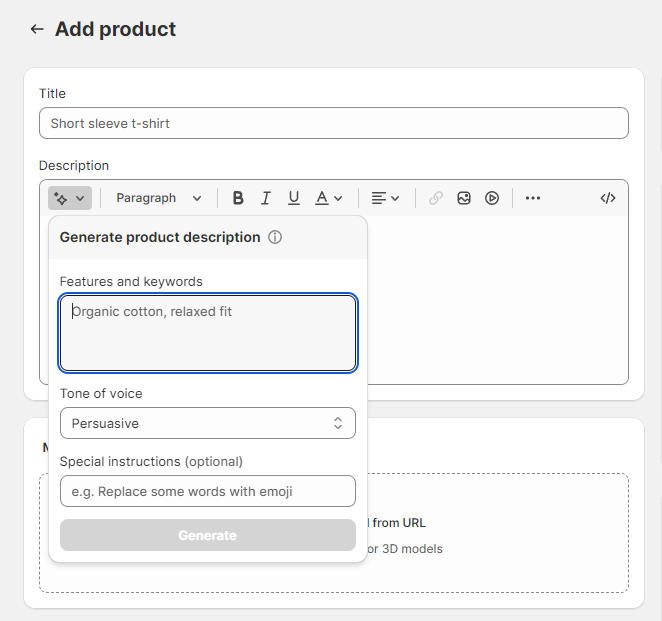
Instapage, with a score of 6.0, offers AI content generation and AI experiments for dynamic traffic allocation. However, it lacks an AI builder and AI ecommerce features, which makes it less competitive in terms of AI capabilities.
User Management
User ManagementAssesses the platforms’ capabilities in managing user roles, permissions, and accessibility.Score Components:
- Role Customization (40%): Flexibility in creating and defining user roles and
permissions. - Ease of Management (30%): User interface and tools for managing users.
- Access Control (20%): Effectiveness of access control measures for different user
levels. - Scalability (10%): Ability to manage a growing number of users efficiently.
 6.5
6.5
 7.3
7.3
🏆 Winner: Instapage
. Managing your online team with Shopify and Instapage involves different approaches to website editing access.
-
Shopify enforces staff account limits based on plans, ranging from 2 to 15, with Shopify Plus offering unlimited
accounts. Collaborators with limited access are also an option. - On Instapage, users managing a website can be assigned different roles: Viewer, Editor, or Manager. A Viewer has limited access, only able to view pages. An Editor can edit pages, and a Manager has full access except for billing information and the audit log. The number of users you can invite depends on your subscription limits. However, only one user can edit a page at a time to prevent overwrite issues.
Shopify User Roles and Access Levels:
| Role | Description | Access Highlights |
|---|---|---|
| Store Owner | Full control over store | Manage products, orders, discounts, payments, apps, settings. Create and manage staff accounts. |
| Staff | Configurable access by owner |
Add/edit products, manage orders, fulfill orders, manage customers, update content. Access level can be customized by the owner. |
| Collaborator | Limited access for external partners | View and manage specific sections like blog or product categories. Cannot access full store settings. |
Instapage User Roles and Access Levels:
| Role | Description | Access Highlights |
|---|---|---|
| Administrator | Oversees the entire Instapage account, managing users, settings, and billing information. | Full access to all features, including user management, settings, billing, and page creation and editing. |
| Editor | Works on creating and editing landing pages, responsible for the design and content. | Can create and edit pages, manage integrations, and view analytics, but cannot change account settings or manage users. |
| Viewer | Has view-only access to the landing pages, typically for review or analytics purposes. | Can view pages and analytics but cannot make any edits or access account settings. |
Additional Features

|

|
|
|---|---|---|
|
SSL Certificate |
|
|
|
Custom Domain |
|
|
|
Free Custom Domain Included |
|
|
|
International Domains |
|
|
|
Mobile Responsive |
|
|
|
Page Speed |
|
|
|
Website Builder Mobile App |
|
|
|
Convert a Website To An App |
|
|
|
Website Analytics |
|
|
|
Multilingual Sites |
|
|
|
Multiple Users |
|
|
User Feedback
Shopify’s slightly higher rating on G2 Crowd can be largely attributed to its specialization in ecommerce. Its comprehensive features, ease of use, and robust customer support cater specifically to online businesses, leading to high user satisfaction among those seeking a dedicated ecommerce solution.
Users generally appreciate Instapage for its user-friendly interface, robust customer support, and seamless integration capabilities, highlighting its effectiveness in creating high-quality, high-converting landing pages optimized for lead capture. Positive feedback emphasizes the platform’s ease of use, allowing both experienced marketers and newcomers to quickly design and deploy landing pages, along with its broad range of integrations with other marketing tools and CRM systems. However, some users encounter challenges with mobile responsiveness, custom domain settings, and occasional bugs.
The making of this blog
We followed a clear, step-by-step process to write and research this article.
FAQ
Can Shopify and Instapage be used together?
Which platform is better for ecommerce, Shopify or Instapage?
Is Instapage suitable for creating an online store?
How do Shopify and Instapage compare in terms of ease of use?
Which platform offers better customer support, Shopify or Instapage?
Can I use Instapage for marketing if I have a Shopify store?










